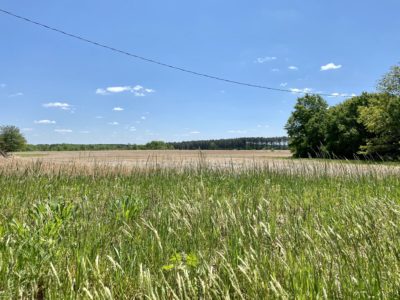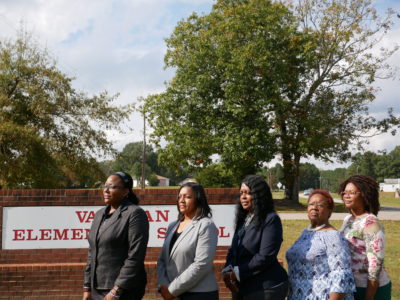

The following is part of my monthly column, One Day and One Goal: Expanding opportunity in NC. I invite you to follow along as I share stories from classrooms and explore critical issues facing education in our state. Go here for past columns.
The vast majority of North Carolina’s counties are rural — 80%, to be precise. And of the 115 traditional K-12 public school districts in our state, 87 are located in rural counties. And yet, if you live in an urban area, it is often shamefully easy to overlook the unique challenges, opportunities, and perspectives of our rural neighbors.
Since our founding more than 30 years ago, Teach For America (TFA) has partnered with rural communities in North Carolina in pursuit of educational equity. In my role as executive director of TFA in North Carolina, I’ve been privileged to connect with several different individuals who are leading for change on the frontlines of rural communities. But one group stands out with a particularly valuable vantage point: school principals.
As National Principals Month came to a close, I spoke with a couple of the TFA alums serving as principals in our state’s rural communities to learn more about how they are caring for students during what has proven to be yet another challenging school year.
If nothing else, the pandemic continues to confirm that leadership in schools — particularly our rural schools — has never been more important. Indeed, studies have shown that behind effective teaching, effective school leadership is the next best leading indicator of student academic success.
It’s no secret that staffing shortages and other challenges — HVAC issues, COVID outbreaks, tragic acts of violence, to name a few — have heaped tremendous additional stressors on school leaders and their staff. Principals are juggling more demands than ever before, and many are wearing hats that extend way beyond their usual job descriptions, be it driving buses, serving lunch in the cafeteria, or substitute teaching.
“We are not little towns stuck in the past.”
In the face of these challenges, the school leaders I spoke with remain motivated, first and foremost, by relationships with students and families in their communities.
Kelly Anne Mudd, a 2006 TFA-Eastern North Carolina alum who serves as the principal of Martin Millennium Academy in Edgecombe County and as a member of the Regional Advisory Board, shared that members of the community are a huge inspiration to her both personally and professionally. “Throughout ENC you will find some of the most hardworking people pushing towards progress and innovation and creativity. We are not little towns stuck in the past. We are small but mighty communities striving for what’s next and what’s absolutely possible,” Mudd wrote in an email. “The pride and love in the community is infectious. It only makes me want to work harder and show up bigger in my work.”
Melanie Johnson Forte, a TFA alum who is the principal of Henderson Collegiate Middle School, has been working in education in Vance County since 2013. She too is motivated by her surrounding community. “I have seen firsthand what can be achieved when students, families, and teachers partner together and work towards the same goal,” Forte wrote. “There hasn’t been a day go by in the last eight years that I’m not inspired in some way by a teacher, family member, or a student. Not one single day.”
Forte is not shy about singing the praises of her school community. “I wish the general public knew how extraordinary and hardworking our families, students, and teachers are in our school community,” she said. “Our students shatter paradigms daily of what people think of normal middle school students. They not only care about their education, but keep it on the forefront of their minds and show up every day determined to get one step closer to the college of their choice.”
She was quick to point to family members as key players in the success of her students. “Our families are not only incredibly supportive of our school’s mission, but are crucial reinforcers of that mission. Because our families reinforce every expectation students hear in school, our mission is not simply a nice phrase on a wall, but truly lived on a daily basis,” Forte said.
Not surprisingly, Forte also emphasized the leading role that teachers play. “Our students and families choose to be extraordinary every day, and I think one reason for many is the trust they’ve built with the teachers in our school community,” she said. “The daily commitment from students, families, and teachers is what leads to success. This commitment shows not only what is possible for a rural community to achieve, it also shows how foolish it is to think it couldn’t be possible.”
Systems-level changes are necessary
Both Forte and Mudd expressed a deep commitment to advocating for change at the systems-level. For example, Forte would like to see the state prioritize building out more robust staffing support structures for schools. “Teaching is as immensely important as it is difficult, and the best educators should be doing it,” she said. “School communities are facing staffing issues that exacerbate the negative impact of the pandemic, and I would like to see the state prioritize recruitment and incentives to attract talented people to such an important job.”
Forte said she also wants to see renewed focus on mental health for school communities. “It goes without saying the toll that the pandemic has had on the mental health of students, families, and teachers,” she said. “While I think every teacher and leader cares about this and knows how important it is, not everyone is equipped to support or respond in the most effective ways. School counselors play a tremendous role in supporting our students, but more support is needed to respond to the impact the pandemic has had on school communities.”
Similarly, Mudd expressed a desire for more attention and resources to go towards more holistic staffing. “I would love to see increased funding for more school-centered resources such as nurses, counselors and social workers,” Mudd said. Also top of mind for Mudd: “Accessible, affordable (free!) pre-K and early intervention services for all tiny humans. Internet connectivity and accessibility.”
Mudd’s advocacy is rooted in her deep respect for the community at large. “Serving in a rural community has shaped my philosophy in a way that encourages collaboration and strongly values the history and stories of the place and people — the celebrated and the hard histories,” she said.
Forte also spoke to the importance of collaboration in her work. “As the third principal of Henderson Collegiate’s Middle School, I feel incredibly fortunate for the strong system I have inherited from [fellow TFA-Eastern North Carolina alums] co-founders Eric and Carice Sanchez, and Principal Coach Frank Terranova’s leadership,” Forte said. “I believe in this system and feel as a leader in my community it is my responsibility to maintain a strong system so that the community I lead in can continue to make systemic growth. I have also learned about the simple yet tremendous importance of leading with love.”
Strengthening our leadership pipelines
Leadership matters, and every student deserves to be in a building with a well-equipped, high-achieving leader. At TFA, we are determined to ensure this happens. To that end, over the next decade, we are prioritizing developing and supporting a strong pipeline of leaders — like Forte and Mudd — who will pursue leadership in our state’s highest-needs schools. We will do this by driving disproportionate investments in the journey to school leadership and school systems leadership through new job matching services, live and virtual learning experiences, and new strategic partnerships with organizations that deliver best-in-class development.
In the meantime, I hope we will all take time to honor the dedication, persistence, and courage of our rural school leaders — especially as they continue to press forward in the face of challenges and lead with love. Every student deserves to be in a building with a well-equipped, high-achieving leader. At Teach For America, we are determined to ensure this happens.




